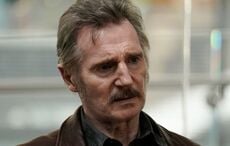The Angels’ Share, the new film by award winning director and writer duo Ken Loach and Paul Laverty, is the irresistibly funny tale of a young father who will stop at nothing to secure a better life for his newborn. The film won the coveted Jury Prize for Loach at the Cannes Film Festival last year, and opens nationally this Friday. Cahir O'Doherty talks to Laverty about the film and his Irish background.
Unemployment is so much a part of the landscape of Ireland and Scotland now that there are tens of thousands of young people there who don’t expect to ever have a job.
With your hopes for a better tomorrow dead in the water, with your life in 10 years almost certain to look and feel the same as it does right now, what’s the point of getting out of bed some rightly ask?
In The Angels’ Share, writer Paul Laverty and director Ken Loach (the creative pair behind the Irish masterpiece The Wind That Shakes the Barley, starring Cillian Murphy) explore this troubling new reality by introducing us to young ne’er do well Robbie (Paul Brannigan).
Robbie is about to become a father, although he's barely made it out of childhood himself. But he's already in a mess of trouble.
His girlfriend's family wants to smash his jaw and run him out of town. He's also facing a stiff sentence for a serious assault, and when it's reduced to community service instead of jail time he's given an unexpected -- and final -- chance to turn his life around.
It's love that saves him, of course. That's what makes The Angels’ Share a major change of tone for the writer and director duo whose last film, Route Irish, explored the terrifying legacy of the Iraq war.
That latter film was a dark and uncompromising meditation on the hubris that led up to (and the horror show that followed) the U.S. invasion and occupation. It was critically lauded internationally, but the crowds stayed away.
“Nobody wanted to see anything about Iraq it turned out, neither the audience or the distributers, but I'm very glad we made we made it,” Laverty told the Irish Voice.
“It dealt with people coming back from the war and post traumatic stress, and the terrible things people saw. So to follow that with The Angels’ Share, we wanted to tell a tale that would make you smile. Something fun for me to write to and Ken to direct.”
The result is a tender and bitingly funny new drama that wowed the jury at the Cannes Film Festival last year and walked off with its coveted Jury Prize for Loach.
In the process it's made a star of Paul Brannigan, 26, the young Scottish Irish actor who grew up in one of the toughest working class neighborhoods in Glasgow to two drug addicted parents. His background gives the film an authenticity from the first frame.
Meeting in person at a Midtown New York hotel, I notice Laverty, 55, whose grandfather hailed from Co. Donegal mother from Co. Limerick, speaks in complete sentences and expresses himself fearlessly. As it turns out we met on Monday, the day that Margaret Thatcher passed away, and Laverty is candid in his estimation of her legacy.
“There’ll be no mention today of her calling Nelson Mandela a terrorist,” he tells the Irish Voice gamely.
“There’ll be no mention of her deep and close relationship with Pinochet. There’ll be no mention of what she set in motion with Ronald Reagan leading to the deregulation of the financial services which gave rise to all this recession.
“There won’t be a word about her dirty tactics and illegalities during the miners’ strikes. She’ll be dancing a jig in hell with Ronald Reagan and Augusto Pinochet, I hope. They’ll be great company for each other. I’m going to crack open a bottle of champagne tonight.”
Although raised in Scotland, Laverty has clearly remained faithful to his Irish ancestry, including protesting Thatcher’s polices toward the North and Sinn Fein throughout the 1980s.
“I actually remember on the day of the royal wedding going down from Glasgow to a hunger strike march,” he reveals with a laugh. “I thought we were going to get lynched. I’ve never seen such venom and hatred directed toward me.”
Loach is currently filming and could not make it to New York for the opening of The Angels’ Share, but he spoke to Laverty by phone on Monday morning and told him that impromptu street parties were breaking out all over Britain to mark the former prime minister’s passing with cake and toasts.
For the student of Irish history that Laverty is, it was an opportunity to remember what a disaster her premiership had been. It was also an opportunity to reflect on the tragedy of English colonialism in Ireland, which The Wind That Shakes The Barley masterfully depicts.
“That was a very important film for both of us. We felt a tremendous sense of responsibility to Irish history, as you can imagine,” Laverty says.
“It’s a very interesting thing because when it won the Palme d’Or (the grand prize at the Cannes Film Festival, in 2006) the one who was really furious was Michael Gove, the man who is now the Conservative minister for education in the U.K. At the time he was a Tory and a freelance journalist.
“I’m paraphrasing what he said, but what he said is very important. ‘These filmmakers have turned history on its head,’ Gove said. ‘What really happened was that Republicans always had an easy way out but always chose the violent path.’”
To address those claims in The Wind That Shakes the Barley, Laverty says he made certain to include the fact that in 1918 Sinn Fein won 72 of 105 seats.
“When that democratic vote was not respected, out of that came the War of Independence. So it was Gove who turned history on its head,” Laverty says.
“It’s a lovely irony that now he’s the minister for education. He’s the one who’s attacking the history syllabus in the schools.”
Laverty's lifelong engagement with politics accidentally led to his career as screenwriter, he reveals. He wrote to Loach in the 1990s when he decided that fiction might be the best way to explore his political preoccupations, and he received encouragement from the filmmaker for his efforts, which led to a decades long collaboration between the pair.
With their Irish-Scottish and English backgrounds, they have kept a particular eye on how the economy has shaped the recent history of all three nations. Ireland's financial troubles have particularly dismayed him.
“There are young people growing up there now whose whole lives are mortgaged to this terrible financial disaster. That deal that was done over the Irish bank bailouts in one night!” he says.
“It was wonderful to see a parliamentary committee discuss the Irish budget in such detail. The only problem was that it was the German parliamentary committee doing it, not the Irish one.”
In The Angels’ Share Loach and Laverty consciously set out to give young people beaten down by decades of poverty and deprivation a once in a lifetime shot a something that would otherwise completely elude them -- a happy ending.
The Angels’ Share, we discover, is the term for the two percent of whiskey that evaporates from a barrel over the course of a year, but it's also a handy description of the unexpected windfall that enriches young Robbie's life just at the moment it's needed most.
The film is a tough as nails but an increasingly hilarious tale with a happy ending for our times, delivered with help from Rhino, Albert and Mo, three former petty criminals also down on their luck.
It's not a fairy tale ending, though. This is Glasgow, and these are harder nuts to crack.
Laverty and Loach know these streets in their bones, as well as the hard won hopes and dreams that reside there. The result is the most compelling new film of 2013.
Catch the trailer for 'The Angels' Share' here:




Comments